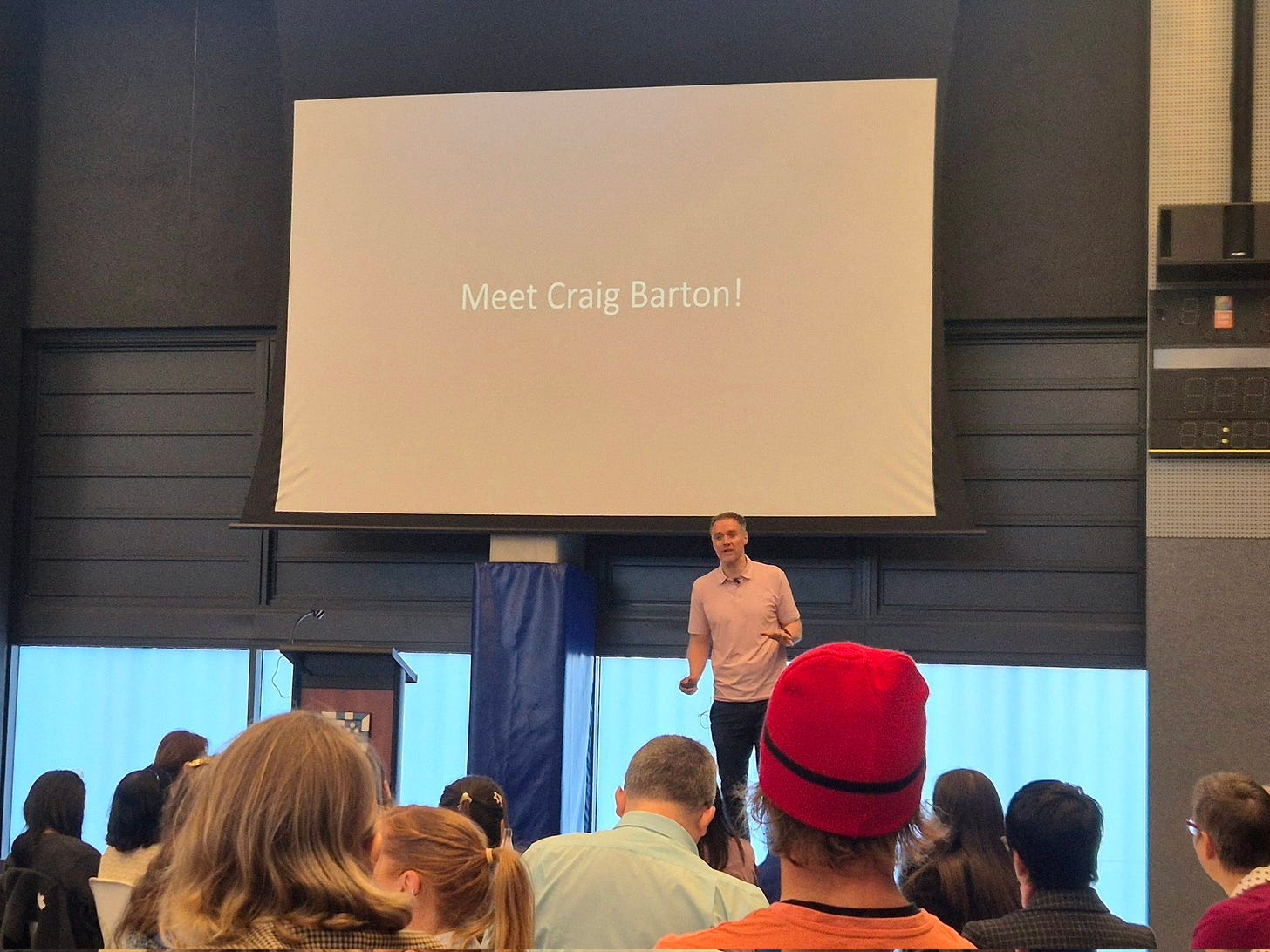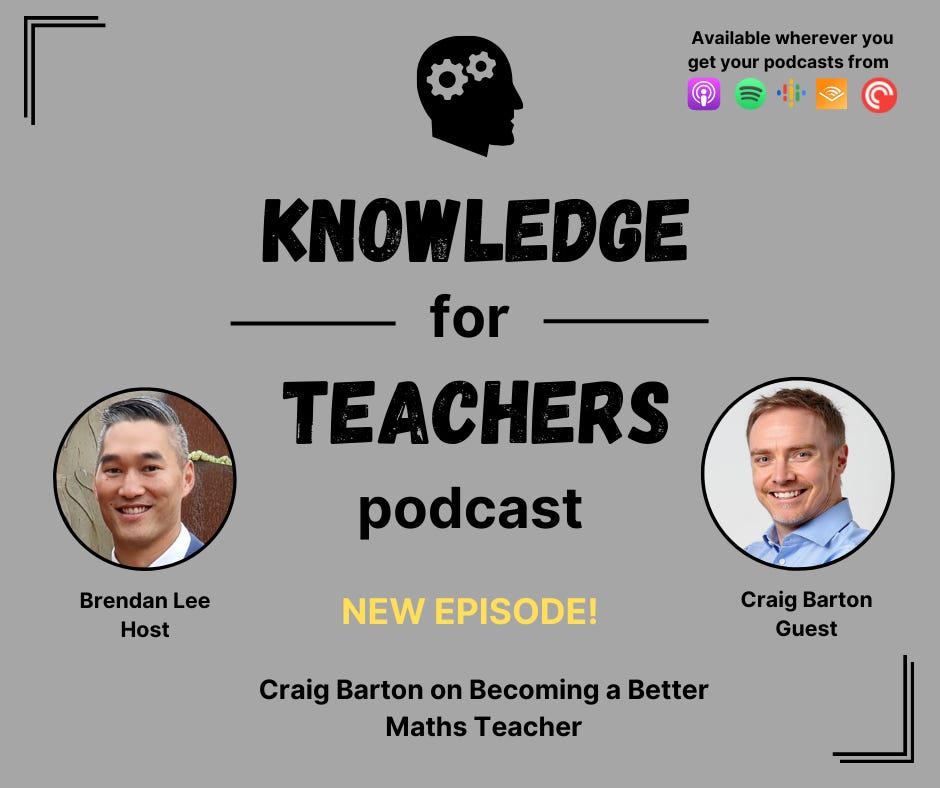What Makes Practice ‘Intelligent’? Craig Barton on Getting More from Maths Tasks
Forget repetitive worksheets. Here's how Craig Barton designs practice that makes students think, not just work.
Top-Up Tuesday: Key Ideas from Past Podcast Guests
Welcome to another Top-Up Tuesday—a short read that helps you top up your professional knowledge by revisiting a key idea from the Knowledge for Teachers podcast.
This week, we’re digging into intelligent practice, a concept brought to life by maths teacher, author and podcaster Craig Barton.
I spoke to Craig in a past episode that’s still one of my most shared conversations. And just last term, I had the chance to see him present live in Sydney—an engaging, down-to-earth speaker whose thinking has clearly evolved through classroom experience, deep reading, and a willingness to change his mind.
Hearing him unpack his thinking again in person reminded me just how one of the most practical ideas he’s developed over time is intelligent practice—and it all started with a moment of surprise.
“This Is the Worst Worksheet I’ve Ever Seen”
Years ago, Craig sat in a workshop run by Bruno Reddy, then Head of Maths at King Solomon Academy. Bruno handed out a worksheet on expanding brackets. The first question was:
(x + 2)(x + 3)
Then:
(x + 2)(x + 4)
(x + 2)(x + 5)
Craig’s initial reaction?
“I said to my mate: this is the most boring worksheet I’ve ever seen in my life.”
But Bruno explained that each question changed only one small detail at a time prompting students to focus, compare, and notice.
It didn’t fully click for Craig that day. But years later, after reading more about variation theory and Engelmann’s work on explicit instruction, it did. He began designing his own sequences, eventually publishing them at variationtheory.com.
The Problem with Most Practice
Craig Barton has seen it too many times:
A worksheet full of questions that all look different. Students dutifully work through them, ticking off answers. But do they understand what they’re doing or are they just performing routines?
“When everything changes from question to question, students can’t see the connections. It’s like running the world’s worst science experiment. You’ve changed all the variables so of course the outcome changes. But no one knows why.”
That’s where intelligent practice comes in.
What Is Intelligent Practice?
Intelligent practice isn’t about drilling the same method over and over. It’s about designing sequences of questions where only one thing changes at a time so students can:
Notice patterns
Make predictions
Explain their thinking
These aren’t random worksheets. They’re deliberately structured to sharpen mathematical thinking.
“Some kids treat them like normal exercises. But others start to predict the next answer before solving it. That’s gold. That means they’re thinking.”
The Four-Step Routine: Reflect, Expect, Check, Explain
To make the most of these carefully designed sequences, Craig encourages students to follow a simple process:
Reflect – What changed from the last question?
Expect – What do I think the answer will be?
Check – Work it out.
Explain – Why was I right or wrong?
This shifts students from passive to active. They're not just solving problems—they're thinking like mathematicians.
“When students expect something to happen and it doesn’t, that creates curiosity. They want to know why.”
It Looks Simple—But It Isn’t Easy
The brilliance of intelligent practice lies in its subtlety. To a teacher skimming a worksheet, the questions might seem repetitive or dull.
“People looked at the site and said, ‘This is the most boring set of questions I’ve ever seen.’ But that’s because they didn’t see the behaviour it was designed to prompt.”
Done well, intelligent practice fosters rich, classroom-wide discussion and metacognition.
But What About Differentiation?
“I used to spend hours making three different worksheets for different levels of students. But with intelligent practice, you don’t need to.”
Because the challenge lies in noticing, predicting, and explaining, the same set of questions can stretch all students:
Some focus on fluency.
Others make generalisations or spot deeper structures.
It's low-floor, high-ceiling practice without the admin overload.
You Don’t Have to Write These Yourself
Designing intelligent practice sequences isn’t easy, especially for busy or early-career teachers.
Craig’s advice?
“Don’t write them from scratch. Use high-quality, pre-designed sequences and spend your time preparing to teach them—not building them.”
You can find hundreds of examples at variationtheory.com. And yes, they’re free.
Mini-Whiteboards Make It Work
Craig emphasises the power of mini-whiteboards alongside intelligent practice. They make student thinking visible in real time.
“I won’t teach a lesson without mini whiteboards anymore. If you’re not using them, how do you know what your students know?”
During a practice sequence, whiteboards let you:
See who’s spotting the pattern
Catch misconceptions early
Adjust your teaching on the fly
Key Takeaways
Intelligent practice = carefully sequenced, minimally varied questions
It encourages prediction, explanation, and deeper thinking
Use the Reflect–Expect–Check–Explain routine to build habits of metacognition
One worksheet can work for all students—differentiation comes through interaction, not tiers
Don’t try to reinvent the wheel. Use existing resources and focus your energy on pedagogy
A Final Word
“These sequences look boring. But they create some of the richest thinking I’ve ever seen in a classroom.”
If you’re tired of practice that just ticks boxes, intelligent practice offers a smarter alternative.
Full episode
Listen to the full episode here or wherever you listen to your podcasts from.




The link to variationtheory.com isn’t opening for me. Anyone else able to get on that site?